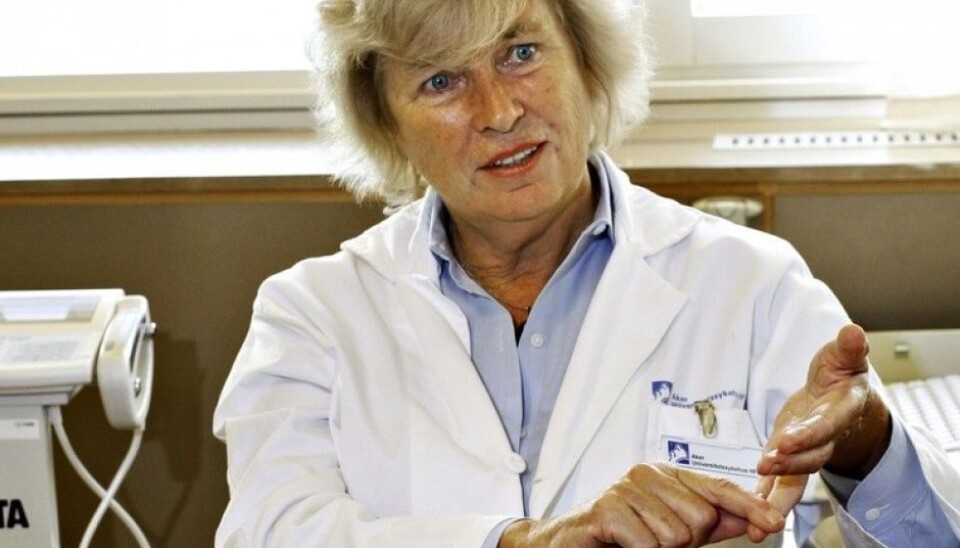
Two patients' results used as evidence that a dietary supplement works
A Norwegian researcher and doctor used a dietary supplement she has patented for obesity treatment. But in her studies showing that the product works, her own business interests aren’t mentioned.
They had tried everything.
The two Norwegian women with severe obesity were treated at Aker University Hospital in Oslo, but the hospital had nothing more to offer. Then they found the private Teres Colosseum clinic, now part of Aleris, which does obesity surgery.
For different reasons, the women did not do the surgery. Instead they opted for lifestyle therapy with retired physician and researcher Grethe Støa Birketvedt, a consultant attached to the clinic. She had previously treated the two women at Aker University Hospital.
Good results from individualized programs
The women followed an intensive program for weight loss and lifestyle change for two years, with extensive follow-up support from Birketvedt.

The results were amazing.
Both women lost approximately 40 kg, mainly from fat loss. Their health improved significantly and they were motivated to continue with the new lifestyle they had learned.
The story could have stopped there, with good health and healthy weight for two patients.
But these patient histories are becoming new obesity research.

Each case is described in its own scientific article, published in 2016. The authors are Birketvedt, Erling Thom and Carl Fredrik Schou, who is an obesity surgeon at the Aleris clinic.
All three authors conclude that the combination of special supplements, a custom diet and a training program — described in Birketvedt’s book The Body in the Brain — may have beneficial effects against severe obesity.
But several things are amiss with these two research articles.
Small study ethics
The articles join a branch of research that often takes place outside of established research parameters. These are always small, short-term studies with few participants. Long-term treatment effects are not measured and side effects are rarely found. The researchers in these studies are happy to recommend supplements and are often active in marketing them.
The two new articles are also seriously deficient in quality standards for scientific research:
• The private interests of the primary researcher — that she holds a patent on the dietary supplement being evaluated — are not noted.
• It is not possible to draw such broad conclusions from individual cases.
• The clinic was not aware that a dietary supplement was used in the treatment.
• The articles were published in scientific journals that are not recognized as authorized research publication channels in Norway.
Supplement documentation
Birketvedt has authored numerous medical studies published in serious journals in recent decades. But it’s also not the first time she has conducted research on products with potential personal economic benefit.
In the early 2000s, she and some colleagues at the University Hospital of North Norway were involved in a study that showed the effectiveness of Wellex diet pills. This kind of scientific documentation is valuable for the companies behind the products.
Rune Skjoldal, executive director of the company selling Wellex, agrees. “The proven efficacy of our slimming product is a small sensation for us. Big firms are struggling for just this kind of evidence. No one else has published efficacy data," he told Dagens Næringsliv in 2006.
Birketvedt didn’t just research Wellex. She also actively participated in the marketing of the product and received both fixed monthly fees and sales royalties. In total, she received over NOK 600,000 from Skjoldal’s company Nutrilex.
According to a 2007 Bergen District Court judgment, Birketvedt also demanded NOK 5.6 million from Skjoldal, because she believed the royalties she was receiving were too low. Birketvedt lost the case.
Held patent
This year's study concerns a similar supplement, in addition to education and diet. According to the study, the supplement played an important role in the women’s fat loss.
What isn’t specified in the two studies is that Birketvedt took out a patent on the supplement in 2009.
“I should have made clear that I had patented the dietary supplement in the United States and Canada. I accept that criticism,” Birketvedt wrote in an email to forskning.no. She claims that the co-authors were aware that she held the patent.
But Carl Fredrik Schou says he did not know about the patent and that this should have been stated in their study.
Didn’t know that supplement was used in treatment
Schou told forskning.no that Birketvedt was responsible for actually treating the two women. She also wrote the research articles.
He says he first became aware that a nutritional supplement was part of the treatment when reading through the article manuscripts in February 2016.
“Of course, I was familiar with Birketvedt’s treatment principles. The use of supplements doesn’t surprise me, but I didn’t get involved with it, and wasn’t specifically informed about it,” Schou said.
Birketvedt on the other hand believes Schou was quite familiar with the treatment regimen and dietary supplement.
Both agree that the supplement is not for sale today. It was previously marketed by Midelfart, according to Birketvedt.
“I had nothing to do with marketing the product, which was discontinued in 2013 for private reasons,” said Birketvedt.
Birketvedt’s book The Body in the Brain is used in her treatment plan, and is currently being translated into English.
Hardly any value
“The results in the two cases may seem impressive, but the studies have hardly any scientific value,” says Jøran Hjelmesæth, a professor at the Morbid Obesity Center in the South-Eastern Norway Regional Health Authority at Vestfold Hospital Trust and the University of Oslo.
“This doesn’t constitute research. The articles are patient histories that appear to be marketing her unproven natural product with her book,” says Hjelmesæth.
He believes it’s irrelevant that Birketvedt’s weight-loss product is not available for sale.
He says, “It’s still something she’s patented and it can create an expectation that the product will come on the market. Combining business and marketing with science is inexcusable.
Birketvedt strongly disagrees that she engages in marketing. “I wanted to prove that for some patients, a plan like this can work. My interest has always been my patients’ best interests, and not self-profit as is being alleged here,” she says.
Birketvedt denies that she has combined business and science research.
“I haven’t described patient histories for product publicity or to make money. I’ve been a very dedicated doctor for my obese patients and have never sought personal profit as described here,” she writes.
The Bergen District Court judgment in the Wellex case shows a different picture of how Birketvedt mixes her weight loss consulting with marketing and product sales. In the court documents, Birketvedt’s lawyer contends that she contributed to the sales of the weight loss product, and that her efforts were financially motivated.
Conflict of interest
Hjelmesæth thinks there’s nothing wrong in principle with doing studies on either diet pills or the program as a whole.
“There’s absolutely nothing reprehensible in Birketvedt researching her own treatment program,” he said. “But conflicts of interest need to be specified and the study must be of high quality.”
By “high quality,” he means a randomized double-blind trial in which researchers compare the new treatment with a placebo or another treatment.
Birketvedt finds Hjelmesæth’s criticism to be completely incorrect.
“This wasn’t trying to be a randomized double-blind placebo-controlled study with a lot of people. This was just one case history designed to show that close follow-up, training and using a dietary supplement can be useful. The journal invited us to publish a single case,” Birketvedt wrote.
Impossible to say what worked
The two articles conclude that it is precisely the combination of supplements, education program and diet that resulted in significant weight loss, and they attribute an important role to the dietary supplement.
But because of the way studies are done, it's virtually impossible to tell what made the difference.
Hjelmesæth says that close patient monitoring has previously been well documented to play an important role, for example.
He also says that it’s not at all uncommon for people with obesity to lose many kilos on an intensive weight loss program, but only a few manage to maintain their new weight.
Birketvedt agrees. “You never know what works best - a dietary supplement, education or close monitoring.” She stands by her articles’ conclusion that it is the combination that provides the greatest effect.
“After 30 years in weight loss treatment in the USA and Norway, I’ve always tried to identify what works best for the individual patient. People aren’t all the same and they won’t get the same treatment,” writes Birketvedt.
Schou believes Birketvedt’s follow-up support was key. She monitored the two patients for a long time and with great patience.
To the reporter’s observation that the two studies found that all three components together caused the weight loss, he said, “Birketvedt is really dedicated to and strongly believes in the extracts she uses, and it’s possible that they’re effective as part of an adjunct therapy. I think it's difficult to answer scientifically.”
Should have been more critical
Schou — who stresses that Aleris Obesity Clinic, where he currently works, is not connected to the two studies — is no longer sure of his role in the studies. “I should have been more critical of my name being on these studies,” he tells forskning.no.
But he defends the articles, saying, “I'm no scientist. But if some scientists don’t agree or are critical of what she describes in the case studies, then they can write a counter-argument. That's how we have professional discussions.”
Schou agrees that if the researchers want the articles to be taken seriously, it isn’t so wise to publish them in journals that aren’t recognized as quality research publications.
Poorly treated
Birketvedt thinks she has been badly treated by the Norwegian press. In 2008, VG wrote about her mixing of roles and about a fake honorary doctorate she received and includes in her CV. An inquiry from the scientific journal BMJ led to the University of Tromsø (UiT) investigating the doctorate that Birketvedt had earned there. The investigation exonerated her of the scientific misconduct accusations.
Birketvedt considers forskning.no’s reviews of her two studies as a continuation of what she calls the “ugly attack on her person.” She wrote that both her health and her family have suffered from the criticism.
Birketvedt explains Hjelmesæth’s criticism as envy and says “envy is greater than sex drive in this country and some people in this country make themselves the judges of other people”.
In an email to forskning.no, she writes that she has not earned any money from writing the two case studies, and that she has never tried to make money on her overweight research or patient care.
Birketvedt concludes with the comment, “I assume it’s not illegal to write books in Norway.”
References:
Grethe S Birketvedt, Carl Fredrik Schou, Erling Thom (2016): A case study: Obesity and the metabolic syndrome. A three-pronged program, targeting education, close follow-up and a dietary supplement, significantly decrease body weight and body fat. Integrative Obesity and Diabetes. doi: 10.15761/IOD.1000143
Birketvedt GS, Schou CF, Thom E (2016) A Dietary Supplement in Combination with an Education Plan and a Long-Term Follow-up Significantly Decrease Blood Pressure, Body Weight and Body Fat. J Nutr Food Sci 6: 512. doi:10.4172/2155-9600.1000512
This article is based on an investigation by journalists at www.forskning.no. You can read the Norwegian version of the article here.

































